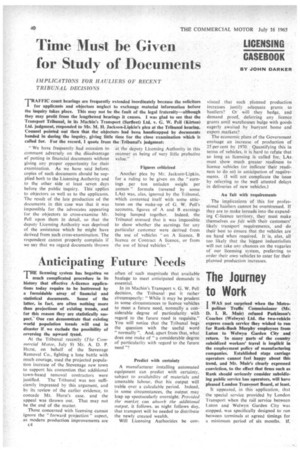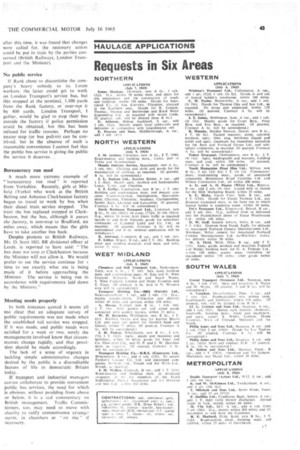The Journey to Work
Page 42

Page 45

If you've noticed an error in this article please click here to report it so we can fix it.
I WAS not surprised when the Metro' politan Traffic Commissioner (Mr. D. 1. R. Muir) refused Parkinson's Coaches (Welwyn) Ltd. the two-vehicle express coach service they wished to run for Rank-Bush Murphy employees from Luton to Welwyn Garden City and return. In many parts of the country subsidized workers' travel is implicit in the employment policy of manufacturing companies. Established stage carriage operators cannot feel happy about this trend, and Mr. Muir's clearly expressed conviction, to the effect that firms such as Rank should seriously consider subsidizing public service bus operators, will have pleased London Transnort Board, at least.
It appeared, in this application, that the special service provided by London Transport when the rail service between Luton and Welwyn Garden City was stopped, was specifically designed to run between terminals at agreed timings for a minimum period of six months. If,
after this time. it was found that changes were called for, the neeessary action could he put in train by the parties concerned (British Railways, London Transport and the Minister).
No public service
If Rank chose to discontinhe the company's heavy subsidy to its Luton workers, the latter could get to work on London Transport's service bus, but this stopped at the terminal, ,100 yards from the Rank factory, or over-ran it by 400 yards. London Transport, 1 gather, would be glad to stop their bus outside the factory if police permission could be obtained, but this has been refused for traffic reasons. Perhaps no nearer stop (or bus pull-in) can be contrived. but in the absence of such a reasonable convenience I cannot feel that the public bus service is giving the public the service it deserves.
Bureaucracy run mad
A much more extreme example of " bureaucracy run mad" is reported from Yorkshire. Recently, girls at Mir.field (Yorks) who work at the British Belting and Asbestos Cleckheaton factory began to travel to work by bus when their diesel train service stopped. The train the bus replaced stopped at Cleckheaton, but the bus, although it passes the factory, is non-stop to Bradford, six miles away, which means that the girls have to take another bus back.
Despite protests to British Railways, Mr. D. Scott Hill, BR divisional officer at Leeds, is reported to have said: "The bus does not stop at Cleckheaton because the Minister will not allow it We would prefer to see the service continue for a time to see exactly what use is being made of it before approaching the Minister. The service is being run in accordance with requirements laid down by the Ministry."
Meeting needs properly
In both instances quoted it seems all too clear that an adequate survey of public requirements was not made when the established rail service was stopped. If it was made, and public needs were satisfied for a week or two, surely the managements involved know that circumstances change rapidly, and that provision should be made accordingly.
The lack of a sense of urgency in tackling simple administrative changes desired by the public is a discreditable feature of life in democratic Britain today.
If transport and industrial managers cannot collaborate to provide convenient public bus services, the need for which is obvious, without prodding from above or below, it is a sad commentary on British management. Traffic Commissioners, too, may need to move with alacrity to ratify commonsense arrangements, in chambers or on site if necessary.




























































































































